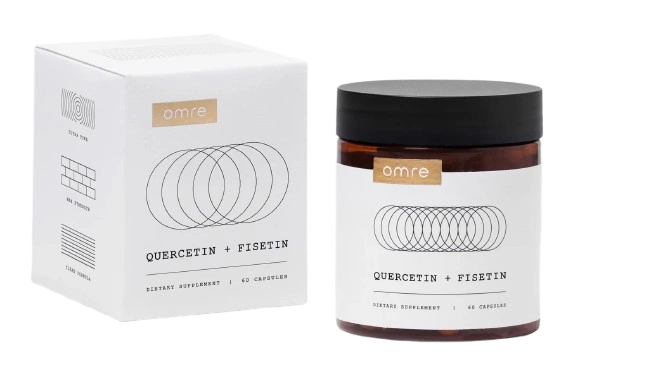Table of Contents
- What Is Quercetin?
- How Quercetin Works in the Body
- How Long Does It Take for Quercetin to Work?
- Are There Any Side Effects While Waiting for Results?
- Potential Health Benefits of Quercetin
- Factors That Influence Quercetin's Effectiveness
- Best Practices for Faster Results
- How to Choose the Best Quercetin Supplement
- Conclusion
When you’re starting a new supplement like quercetin, it’s natural to wonder how soon you’ll feel the benefits. Whether you’re taking it for allergies, inflammation, or general wellness, the timeline can vary depending on factors like dosage and individual health.
In this article, we’ll break down what quercetin is, how it works in your body, and how long you might need to wait before noticing changes. Let’s dive in.
Quercetin + Fisetin
Quercetin and Fisetin help manage 'zombie' senescent cell burden and support cellular rejuvenation.*
What Is Quercetin?
Quercetin is a natural antioxidant found in foods like apples, onions, berries, and leafy greens. It’s widely known for its ability to support your immune system and reduce inflammation. Many people turn to quercetin supplements to manage allergies, protect against oxidative stress, or support overall wellness.
At its core, quercetin is a flavonoid—a plant compound with powerful health benefits. It works in your body by neutralizing harmful free radicals, which can damage cells and lead to chronic diseases.
Beyond this, it plays a role in regulating inflammation and supporting healthy immune responses, making it a versatile addition to your daily routine.
You may already be consuming small amounts of quercetin without realizing it, thanks to your diet. Foods like red onions and capers are especially rich sources.
However, for therapeutic benefits like allergy relief or reducing inflammation, supplements often provide a more concentrated dose than you’d get from food alone.
How Quercetin Works in the Body
Quercetin works by fighting oxidative stress and reducing inflammation in the body. Its antioxidant properties help combat free radicals—unstable molecules that can harm cells and accelerate aging. This makes quercetin a key player in promoting overall cellular health.
One of its most impressive tricks is calming inflammation at the source. Quercetin inhibits certain pathways, like NF-κB, which are responsible for triggering inflammatory responses in the body.
By doing so, it helps soothe chronic inflammation that’s often linked to conditions like arthritis and heart disease.
Quercetin also shines when it comes to immune health. It supports the body’s natural defenses, helping you fight off illnesses more efficiently.
Studies suggest that it may even provide extra support during viral infections by enhancing the body’s immune response and reducing the severity of symptoms (1).
How Long Does It Take for Quercetin to Work?
-v1737406091148.webp) Most people notice the effects of quercetin within 2–4 weeks, especially if they’re using it to manage allergy symptoms or inflammation. The timeline can vary depending on factors like dosage, consistency, and individual health conditions.
Most people notice the effects of quercetin within 2–4 weeks, especially if they’re using it to manage allergy symptoms or inflammation. The timeline can vary depending on factors like dosage, consistency, and individual health conditions.
Short-term benefits, like reduced seasonal allergy symptoms, may become apparent after just a few weeks of regular supplementation.
However, long-term benefits, such as improved cardiovascular health or enhanced immune support, might take several months to show noticeable results.
Remember, quercetin isn’t a quick fix—it’s more like planting a seed.
The results take time to grow, but with consistent use, you’ll likely notice steady improvements in how you feel. Pairing quercetin with a healthy lifestyle can also speed up its impact.
Are There Any Side Effects While Waiting for Results?
Quercetin is generally well-tolerated by most people, making it a safe option for daily use. However, like any supplement, it can come with mild side effects for some.
Occasionally, people report digestive discomfort, such as nausea or an upset stomach, especially when taking higher doses.
Rarely, headaches might occur, but these are typically mild. If you’re on blood pressure medication, quercetin’s ability to lower blood pressure might amplify the effects, so it’s worth discussing with your doctor first.
Studies have confirmed quercetin’s safety when taken as directed, but listening to your body and starting with a lower dose can help minimize any potential side effects (2).
Potential Health Benefits of Quercetin
Quercetin has gained attention for its potential to support overall health, thanks to its antioxidant and anti-inflammatory properties. While research is still ongoing, here are some of the key benefits scientists have explored:
May Reduce Inflammation
Studies have found that quercetin may help lower inflammation by targeting free radicals and reducing inflammatory markers like TNFα and IL-6.
For instance, an 8-week study with women suffering from rheumatoid arthritis noted significant reductions in pain and stiffness when participants took 500 mg of quercetin daily (3).
This suggests that it might play a role in managing chronic inflammation linked to conditions like arthritis and heart disease.
Might Ease Allergy Symptoms
Research suggests that quercetin’s anti-inflammatory properties could extend to allergies as well (4). By suppressing histamine release and other allergy-triggering chemicals, it might help manage symptoms such as sneezing, itching, and congestion.
While promising results have been observed in test-tube and animal studies, more human trials are needed to confirm its effectiveness in this area.
May Support Brain Health
Quercetin’s antioxidant properties have been linked to potential protective effects against degenerative brain disorders like Alzheimer’s disease.
Studies in mice found that quercetin injections improved learning and memory while reducing markers of Alzheimer’s (5).
While this is promising, human research is required to understand how it translates to long-term brain health.
Might Lower Blood Pressure
High blood pressure is a common issue, and quercetin might offer some support.
In a review of human studies, participants who took more than 500 mg daily experienced moderate reductions in systolic and diastolic blood pressure (6).
While not a substitute for traditional treatments, it could be a complementary approach for heart health.
Quercetin + Fisetin
Quercetin and Fisetin help manage 'zombie' senescent cell burden and support cellular rejuvenation.*
Factors That Influence Quercetin's Effectiveness
Quercetin’s effectiveness depends on several factors, ranging from how it’s taken to individual health conditions. Here are some key points to consider:
Dosage: Taking the right amount of quercetin is important. Studies suggest that doses of 500–1,000 mg daily may yield the best results, but individual needs can vary based on health goals and conditions (7).
Bioavailability: Quercetin is naturally difficult for the body to absorb. Pairing it with healthy fats like olive oil or supplements designed for better absorption can help you get the most out of it.
Consistency: Regular supplementation is key to experiencing benefits. Skipping doses or stopping too soon may reduce its effectiveness, especially for long-term goals like cardiovascular health.
Diet and Lifestyle: A healthy diet rich in other antioxidants and anti-inflammatory foods can enhance quercetin’s effects. Limiting processed foods and stressors that contribute to oxidative damage may also help.
Underlying Health Conditions: Your overall health, including inflammation levels and immune function, can influence how quickly and effectively quercetin works.
Best Practices for Faster Results
To get the most out of quercetin, consistency and a thoughtful approach can make a big difference. Here are some simple tips to keep in mind:
Start with a manageable dosage, typically around 500–1,000 mg per day, as most studies recommend. If you’re new to quercetin, it’s a good idea to start on the lower end and adjust as needed. Pairing it with meals containing healthy fats can also improve absorption.
Be patient. While some people may notice relief from allergies or inflammation within a few weeks, other benefits, like cardiovascular or brain health, can take months to become apparent. Think of quercetin as a long-term investment in your well-being.
Focus on a balanced lifestyle. Quercetin works best as part of a healthy routine. Eating plenty of fruits and vegetables, staying active, and managing stress can all complement its effects and help you feel your best.
Finally, consider using quercetin with complementary compounds like fisetin. These two flavonoids share similar properties, including their ability to clear senescent cells.
When used together, they may enhance each other’s senolytic activity, helping to promote tissue regeneration and cellular health. Supplements that combine quercetin and fisetin can simplify your routine while amplifying the benefits.
With the right approach, quercetin can be a valuable addition to your wellness plan, offering support for inflammation, immune health, and beyond.
How to Choose the Best Quercetin Supplement
Choosing the right quercetin supplement can feel overwhelming with so many options available. The key is to find a product that not only delivers quality ingredients but also supports your specific health goals.
Here are some factors to keep in mind when selecting a quercetin supplement:
Formulation: Look for a supplement that combines quercetin with complementary ingredients, such as fisetin or bioflavonoids, to enhance its effectiveness.
Bioavailability: Quercetin can be tricky for the body to absorb. Opt for products using advanced formulations like quercetin phytosome to ensure better absorption.
Dosage: Choose a product with an effective dose. Studies suggest that 500–1,000 mg per day can deliver the best results.
Safety and Purity: Select supplements that are third-party tested and free from contaminants like heavy metals, bacteria, and fungus. This ensures you’re getting a clean product.
Brand Transparency: Trustworthy brands openly share their research, ingredient sourcing, and testing processes.

If you’re looking for a high-quality option that ticks all these boxes, Omre Quercetin + Fisetin is worth considering.This doctor-developed formula combines 500 mg of highly absorbable quercetin phytosome with 100 mg of 98% pure fisetin. Together, these compounds target “zombie” senescent cells—non-functioning cells that can accelerate aging by releasing harmful inflammatory signals.
By helping your body manage these cells, Omre’s supplement supports cellular rejuvenation, chronic inflammation management, and healthy aging.
What makes Omre stand out is its commitment to quality. Manufactured in GMP-certified facilities and rigorously third-party tested, the product is designed to deliver proven benefits while maintaining safety and purity.
Whether you’re looking to support heart and brain health or reduce inflammation, Omre provides a research-backed solution.
Conclusion
Quercetin is a powerful antioxidant with the potential to support inflammation reduction, heart health, allergy relief, and more. While it may take some time to notice the effects, consistent supplementation and choosing the right product can maximize its benefits.
Pairing it with complementary ingredients like fisetin can further enhance its impact on cellular health and aging.
If you’re ready to explore the benefits of quercetin and fisetin combined, Omre Quercetin + Fisetin offers a top-tier option backed by science.
Ready to start your journey toward healthier aging? Check availability today!






-v1737404237361.webp)